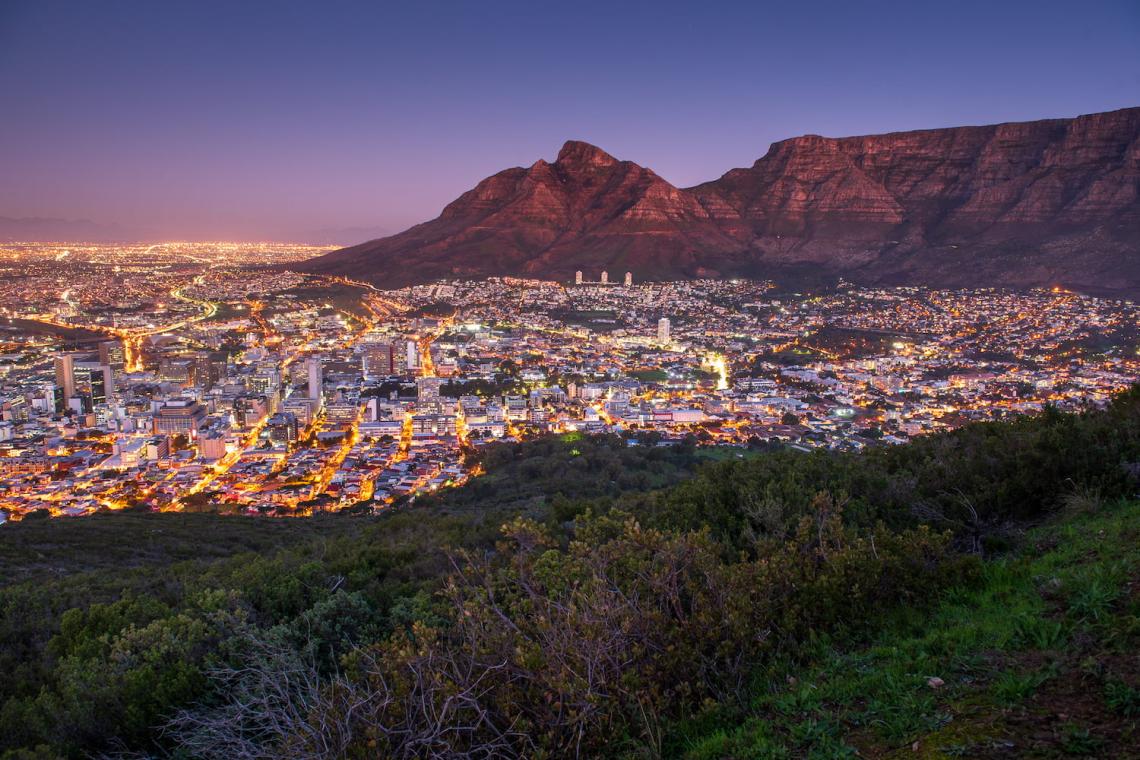One of My first memories was of a house we lived in with two cars, a study, a lounge, three bedrooms, a garage to park the vehicles and a manicured garden. Like most of us, I was born into a relationship with debt. From a very young age, it was a lifestyle my family introduced me to. Things I wanted as a child became a priority for my parents. To create a home for the family, we have mortgages, which we refinance for the upgrades, a little debt for that new car, and credit cards to fund holidays. Many marketers have realised that parents' spending has very few barriers when it comes to their children; if the kids need it, we have to do it; debt is what provides.
Born into a World of Debt: Suburban Lifestyles and Their Hidden Costs
When I started my career as a young adult, this was the image of a Western lifestyle I had in my mind. Like many, this is seen as the ideal lifestyle; people strive to reach these suburban lifestyles worldwide. We needed to provide for our family. From a young age, the world tells us we are failures; if we do not have this, we do not have that. It was important, no it was critical, for me to get that house and two cars; no date was soon enough. Movie makers portray these lifestyles as normal, marketers play on our various needs for safety, belonging and actualisation to entice us to open our wallets to actualise this lifestyle, and politicians play on our fears and offer promises of better lifestyles for all. But ultimately, we borrow from peace to have things and experiences.
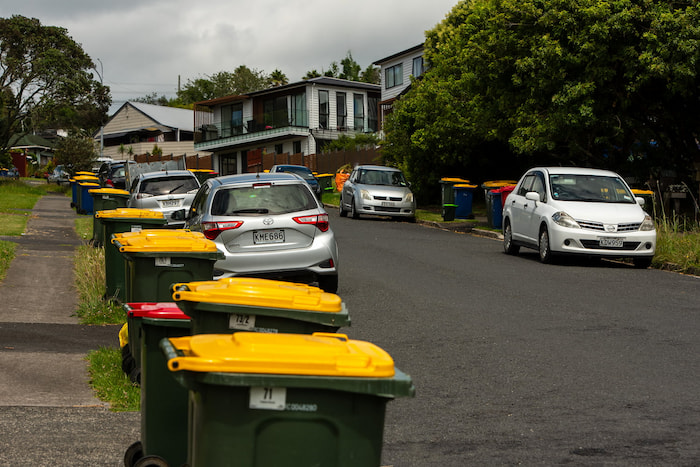
Auckland: Bin day in the suburbs
A False Sense of Normal: The Environmental Cost of Our Lifestyles
Like the lifestyle we believe is normal, that we are born into. We also get born with a certain amount of biodiversity or wildlife on this earth, which we think is normal. But the fact is that the wildlife alive today is 73% less than in 1970. At the same time, the CO2 in the air was at 326ppm in 1970; as I am writing this article, yesterday's CO2 in the air was at 422ppm, 29.4% higher. The wildlife, or the CO2 in the air at the turn of the previous century, was a much different picture, a totally different normal. Ultimately, our perception of a normal life is not normal—the lifestyles we are used to are indebted to nature.
Debt’s Personal Toll: How Our Lifestyle Choices Affect Well-Being
Our lifestyles and the global credit and capital system are what make capitalism work. Increasing demand and fueling growth the markets yearn for. Many people have connected the consumption of the capitalistic system with the environmental impact. But not many of us seem to connect it to the debt problem. The debt that fuels our economy. We go to University and prepare for this lifestyle. We study how to optimise this capitalistic system and how to administer its debt, and we learn how to market debt and lifestyles to others. We borrow from our future selves, future generations, and society to have gratification. For example, overeating now, dealing with the consequences later.
This lifestyle takes a personal toll on our health and well-being. We struggle to be mindful and grateful for what we already have. What mother nature provided for us. The air we have to breathe. The beautiful natural areas where we have to relax. The minimalism movement and the peace and happiness experienced by minimalist cultures like Buddhists for thousands of years show us how living with less can actually provide us with a certain beauty in life. An existence that provides us with more time for the things that matter. The debt we carry is like an overdraft. We carry it in our minds, in our being, and it removes peace and happiness from our budget just like debt removes blocks of money from our now. I leave this section with a question. Is there more peace and joy in having no things and no debt or in having many things and debt?
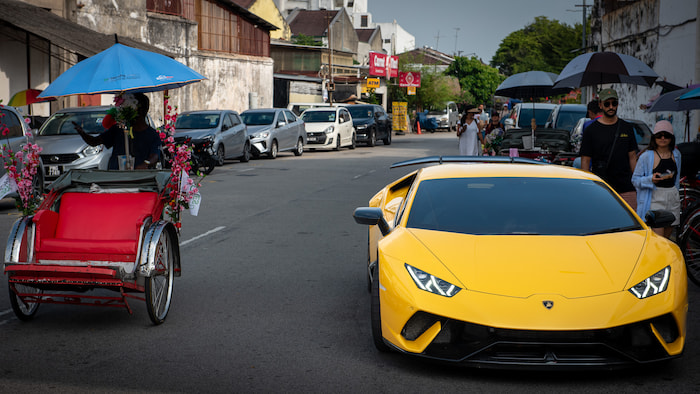
Sports car and rickshaw in Penang
The Debt of Moments: Living for Now or Paying for the Past and Future
The idea of debt of moments is the idea that we are not living for now. If we live in the past with regrets and constantly relive the past, it is like paying for moments after we have lived them. Just like we do with debt repayments, planning for the future is like spending time now preparing for something that may or may not happen in the future. When this moment is focused on future happiness, the utilitarian notion of happiness, it is not inherently wrong, as too little planning has its consequences. Still, too much worry about the future causes us not to live our lives. It is almost like we invest our entire income for the future but never use it to live today. Knowing that now is critical; noticing now, noticing the people, nature, and wildlife around you, as well as their suffering, is critical.
Striking a Balance: Living in the Present While Planning for the Future
I am not advocating that we stop planning for the future; striking a balance is critical. Sometimes, spending a little time now working for the future will pay more dividends. Just like when we go to university, and we study and immerse ourselves in the knowledge of wildlife, the environment for environmental purposes, for example. Ultimately, this can have a massive impact on us and the planet. But how much time is dedicated to the future and how much is spent on now is very important. It's almost like an investment. Maybe balance is key; we can use 30% of our time to work on the future and the bulk of our time, 70%, for example, to live in the now. Mindfully present in the present while we prepare for the future.
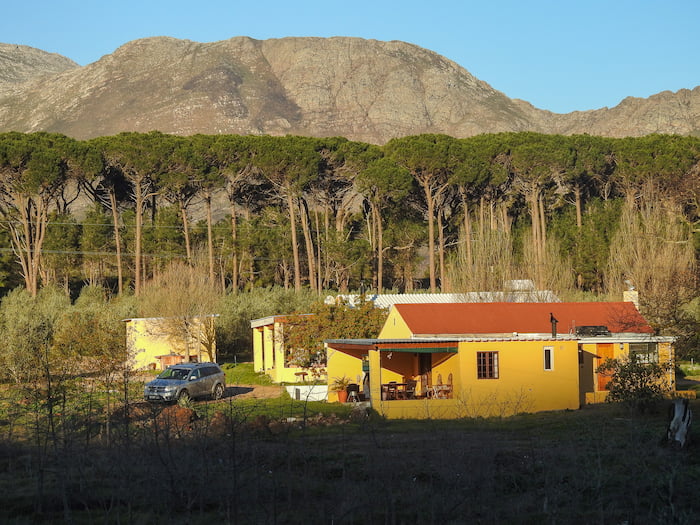
Cape Town: A former house where I stayed in the countryside
Society's Burden: The Societal Impacts of a Debt-Driven Economy
Society suffers, too, and these lifestyles we desire to take their toll. So many stressed people run around trying to make a living trying to pay student loans, mortgages and other debt. The stress and impact drive other actions we frown on as a society. Ilegal action, unethical actions. In a real case, a bank employee starts to siphon off money to pay her overwhelming debt, medical expenses, and her kid's school fees. Her fraud works; she pays off her debt, but then the lifestyle demands a pool because the kid's friends have a pool and so just a little more, which results in an arrest. Where did it all start? It started with the debt to keep up with the lifestyles of others. Many societal challenges can be linked to this.
Corporate and Government Debt: The Global Environmental Impact
However, it is not just our personal debt that has this impact; it is corporate and government debt, too. Research shows an American homeless person has more environmental impact than an individual with massive houses, cars and other polluting devices in many other countries due to their society's collective infrastructure impact. Collective societal infrastructure fueled by debt. But at what price? The access to debt fuels the inflation of services and infrastructure. Once our generation passes on, our debt is not our problem anymore; it is absolved in a way that places a toll on future society.
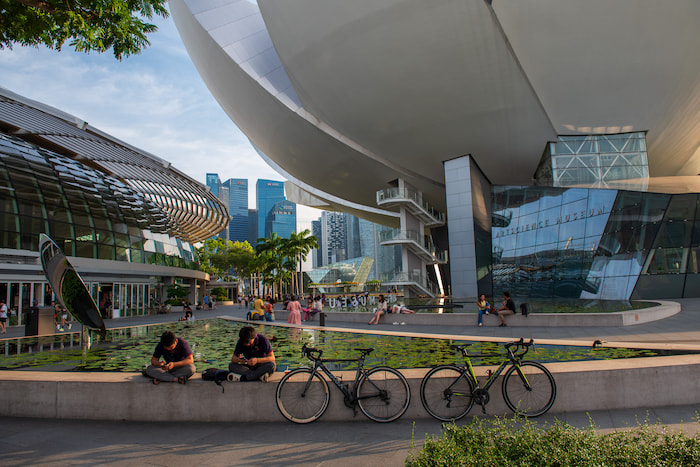
Singapore: ArtScience Museum and city banks backdrop
Debt with Purpose: Creating Positive Change in Society
Debt can positively influence a capitalistic society with few safety nets. It can be used to start a small business and provide livelihoods and jobs. For marginalised individuals, making a small loan now can deliver more significant returns later, delivering a positive social impact. Investment in academic studies, now using future earnings, can result in a job later and ultimately provide for our families. However, while debt can offer opportunities for growth and empowerment, it’s crucial to recognise the historical context that has shaped our current relationship with debt.
Is It Your Fault?
Be mindful, but forgive yourself. The origins of our current debt-driven lifestyle can be traced back to significant advancements in technology and economic theory that occurred long before we understood their implications for our planet. For instance, the steam engine, developed in 1712 by Thomas Newcomen, revolutionized transportation and industry but predated our awareness of biodiversity and the importance of conservation. Charles Darwin's theory of evolution, published in 1859, began to illuminate the interconnectedness of life on Earth. However, it emerged well after the Industrial Revolution had already set humanity on a path of consumption and resource extraction. Adam Smith's seminal work, The Wealth of Nations, published in 1776, laid the foundations for modern economics, promoting self-interest as a driving force for economic growth without foreseeing the environmental costs of unfettered capitalism.
The Environmental Debt Crisis: How Borrowing from the Planet Can’t Continue
The link between debt and the environment was introduced to me in the book 'Zen and the Art of Saving the Planet' by Thich Nhat Hanh. He writes, "Our civilization is a civilization of borrowing. Whenever we want something we can’t afford, like a house or a car, we count on our bodies and our labour in the future to pay back the debt. We borrow and borrow without knowing if we can ever pay back. In this way, we have borrowed from ourselves, from our health, and from the planet. But the planet can’t take it anymore. And we have borrowed too much from you, our children and grandchildren."
These Western lifestyles, fueled by debt, multiplied by 8 billion people who aspire to it, are not sustainable. Ultimately, we are indebted to future generations' access to land, clean water, clean air, resources and other human and animal rights. The impact is not only on future generations but also on other less fortunate people, wildlife, people we love, and ultimately, ourselves and our health. Globally, we have implemented systems of, for example, carbon credits to try to put cost to the 'free' resources we are taking from Mother Earth. But these actions have had limited success. Ultimately, like debt is a way to use future income, we live on future generations' resources.
Conclusion: Are We Spending Our Grandchildren’s Resources Today?
We see a micro example of saving for the future when we look at the squirrel that hides away his nuts for the future. His savings provide for him food in the off-season. Another example is the Bible's seven good and bad years. Life has seasons; we use the energy we have when we are young to work and accumulate for the future. But have we moved from saving our income and resources for the future and future generations to creating debt to spend our grandchildren's resources today? Are we using our debt to purchase other creatures' habitats? Are we polluting our grandchildren's air and changing their climate for another drive to the mall in a new luxurious car?
What Can I Do?
Practice Mindful Consumption
Focus on what you truly need and appreciate the present moment. Reduce reliance on material goods to find peace in simplicity, just as minimalist cultures have done for centuries.Invest in Sustainable Choices
Support products, services, and policies that prioritise environmental sustainability. Whether it’s shifting to renewable energy, choosing eco-friendly brands, or advocating for green initiatives, these small choices can reduce your ecological debt.Live with Balance
Plan for the future while staying grounded in the present. Allocate time for both personal growth and mindfulness, ensuring that you enjoy life now without borrowing too heavily from the future.Educate and Empower Others
Spread awareness about the connection between debt, consumption, and environmental impact. Encourage family, friends, and communities to make responsible, sustainable decisions that benefit future generations.
Main Image: Cape Town City Centre and Table Mountain. All photos by Adriaan Buys

